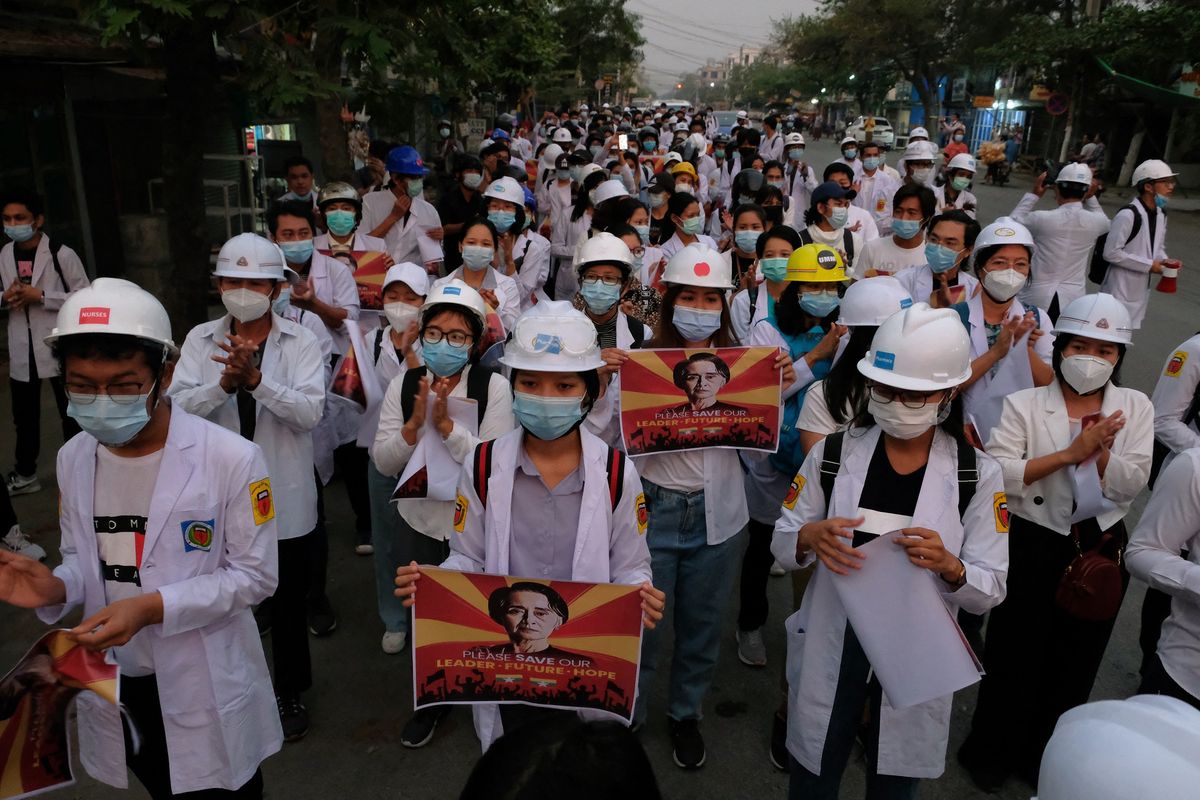
KOMPAS.com - The United States and the European Union imposed sanctions on Myanmar’s military leaders who are linked to last month’s military coup, as anti-coup protesters staged protests again, despite the regime’s violent and increasingly deadly pushback.
The European Union issued a freeze on assets and a visa ban for the military’s commander-in-chief, Min Aung Hlaing, as well as nine other senior military officers and the head of the country’s election commission.
An EU statement said the sanctions are part of the bloc’s “robust response to the illegitimate overthrowing of the democratically elected government and the brutal repression by the junta against peaceful protesters.”
Also read: Indonesia’s President Jokowi Urges Peaceful End to Myanmar Crisis
Meanwhile, the US Treasury Department sanctioned Myanmar's police chief and an army special operations commander Monday, saying they were responsible for using lethal force against demonstrators. The United States has already placed sanctions on Myanmar's top coup leaders.
There were no reports of an immediate response from the junta to the growing list of punitive actions taken by the international community.
“The Burmese security forces’ lethal violence against peaceful protesters must end," said Andrea Gacki, director of the US Treasury's Office of Foreign Assets Control.
The sanctions came as hundreds of Myanmar demonstrators marched before dawn Monday along the main road in Mandalay, many of them doctors, nurses, students, and other medical personnel wearing white coats, repeating a similar demonstration carried out the day before.
Scores of motorists in the commercial capital of Yangon honked their horns in response to a call on social media, according to Reuters.
Also read: Indonesia Redoubles Efforts to Resolve the Myanmar Crisis
Myanmar has been in turmoil ever since the military jailed de facto leader Aung San Suu Kyi and other members of the civilian government on February 1. At least three people were killed Sunday in violent clashes between police and civilians, including two in Mandalay, Myanmar’s second-largest city and a major hub of opposition.
The UN Human Rights Office said Monday that at least 224 civilians have been confirmed killed at the hands of security forces, including while in custody. The United Nations said the real figure could be more than 250, according to spokesman Farhan Haq.
An activist group, the Assistance Association for Political Prisoners, said more than 2,000 people have been detained since the coup began.
Australian authorities confirmed Sunday that two of its citizens identified as business people were detained in Myanmar. Australia’s government declined to provide further details, citing the privacy of the concerned parties.
Also read: Indonesia Urged to Refrain From Strong Statements on Myanmar Coup
On Friday, United Nations Secretary-General Antonio Guterres strongly condemned the continuing brutality of the Myanmar military after at least eight anti-coup demonstrators were killed in the central town of Aungban in eastern Shan state.
“The killing of peaceful demonstrators and arbitrary arrests, including of journalists, is utterly unacceptable,” Guterres’ spokesman Stephane Dujarric told reporters Friday. “The military continues to defy calls, including by the (UN) Security Council, to end violations of fundamental human rights and return to the path of democracy.”
He said that a firm, unified international response is urgently needed.
“The secretary-general will continue to stand with the people and their aspirations to achieve a peaceful, stable, and prosperous Myanmar,” Dujarric added.
Simak breaking news dan berita pilihan kami langsung di ponselmu. Pilih saluran andalanmu akses berita Kompas.com WhatsApp Channel : https://www.whatsapp.com/channel/0029VaFPbedBPzjZrk13HO3D. Pastikan kamu sudah install aplikasi WhatsApp ya.
































